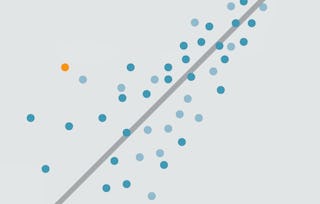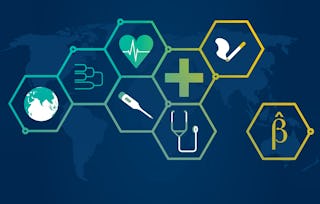Linear models, as their name implies, relates an outcome to a set of predictors of interest using linear assumptions. Regression models, a subset of linear models, are the most important statistical analysis tool in a data scientist’s toolkit. This course covers regression analysis, least squares and inference using regression models. Special cases of the regression model, ANOVA and ANCOVA will be covered as well. Analysis of residuals and variability will be investigated. The course will cover modern thinking on model selection and novel uses of regression models including scatterplot smoothing.

Regression Models

Regression Models
This course is part of multiple programs.



Instructors: Brian Caffo, PhD
151,885 already enrolled
Included with
3,375 reviews
What you'll learn
Use regression analysis, least squares and inference
Understand ANOVA and ANCOVA model cases
Investigate analysis of residuals and variability
Describe novel uses of regression models such as scatterplot smoothing
Skills you'll gain
Details to know

Add to your LinkedIn profile
See how employees at top companies are mastering in-demand skills

Build your subject-matter expertise
- Learn new concepts from industry experts
- Gain a foundational understanding of a subject or tool
- Develop job-relevant skills with hands-on projects
- Earn a shareable career certificate

There are 4 modules in this course
This week, we focus on least squares and linear regression.
What's included
9 videos11 readings1 assignment3 programming assignments
This week, we will work through the remainder of linear regression and then turn to the first part of multivariable regression.
What's included
10 videos5 readings1 assignment3 programming assignments
This week, we'll build on last week's introduction to multivariable regression with some examples and then cover residuals, diagnostics, variance inflation, and model comparison.
What's included
14 videos5 readings2 assignments3 programming assignments
This week, we will work on generalized linear models, including binary outcomes and Poisson regression.
What's included
7 videos6 readings1 assignment4 programming assignments1 peer review
Earn a career certificate
Add this credential to your LinkedIn profile, resume, or CV. Share it on social media and in your performance review.
Instructors

Offered by
Explore more from Probability and Statistics
 Status: Free Trial
Status: Free TrialWesleyan University
 Status: Free Trial
Status: Free TrialDuke University
 Status: Free Trial
Status: Free TrialUniversity of Michigan
 Status: Free Trial
Status: Free Trial
Why people choose Coursera for their career

Felipe M.

Jennifer J.

Larry W.

Chaitanya A.
Learner reviews
- 5 stars
64.34%
- 4 stars
22.85%
- 3 stars
7.55%
- 2 stars
2.96%
- 1 star
2.28%
Showing 3 of 3375
Reviewed on Feb 9, 2016
This was a tough class covering a lot of material. The last week on logistic regression completely lost me. If you're new to stats like me you might want to take it more than once.
Reviewed on Aug 1, 2017
Great introductory course on Regression Models. Super practical and well explained. Definitely doing the exercises and final project is a must to get all the learnings!
Reviewed on Oct 15, 2017
It is very interesting, however is difficult to follow the math explanations, it could be more easy with practical examples.... like the final assignment, it was difficult to me.

Open new doors with Coursera Plus
Unlimited access to 10,000+ world-class courses, hands-on projects, and job-ready certificate programs - all included in your subscription
Advance your career with an online degree
Earn a degree from world-class universities - 100% online
Join over 3,400 global companies that choose Coursera for Business
Upskill your employees to excel in the digital economy
Frequently asked questions
To access the course materials, assignments and to earn a Certificate, you will need to purchase the Certificate experience when you enroll in a course. You can try a Free Trial instead, or apply for Financial Aid. The course may offer 'Full Course, No Certificate' instead. This option lets you see all course materials, submit required assessments, and get a final grade. This also means that you will not be able to purchase a Certificate experience.
When you enroll in the course, you get access to all of the courses in the Specialization, and you earn a certificate when you complete the work. Your electronic Certificate will be added to your Accomplishments page - from there, you can print your Certificate or add it to your LinkedIn profile.
Yes. In select learning programs, you can apply for financial aid or a scholarship if you can’t afford the enrollment fee. If fin aid or scholarship is available for your learning program selection, you’ll find a link to apply on the description page.
More questions
Financial aid available,
¹ Some assignments in this course are AI-graded. For these assignments, your data will be used in accordance with Coursera's Privacy Notice.

